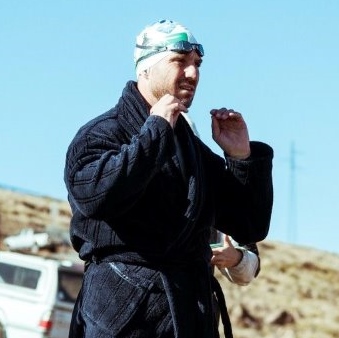
News

Swimming through ice to challenge human limitations
OWN CORRESPONDENT
Mayer went to the Afriski Mountain Resort in the Lesotho Highlands to do the ice swim because he wanted “to push my body to the ultimate limit of human endurance and survival”. The event was done in water so cold, it “would kill the average human in a matter of minutes”.
When Mayer (46) and others planning to swim arrived at the resort, the lake was frozen, so a path had to be cut for them to achieve their goal. They did a 500m qualifying swim and then the 1 000m event the following day. Mayer did his qualifying swim in 8.57 minutes, and the 1 000m in 18.27 minutes.
“It is impossible to explain to anyone what two degree water feels like. It is one of the most painful things I have ever experienced,” he said.
“The day we got there, we had an acclimatisation swim at 17:15 in the afternoon. The water had dropped from 2.5 degrees in the afternoon to 1.9 degrees. We got into our Speedos, caps and goggles, and swam for a few minutes. Nothing I have done could prepare me for what I experienced in that short six minutes, but it felt as if my hands had exploded. The pain was so intense, I had to stop at one stage to look at my hands to see if they were still attached to my arms.
“I got out, got dressed as quickly as I could, and tried to warm up.
“I got very little sleep that night, as I knew that I was in for a hard and painful 500m qualifying swim the next day. A million thoughts were rushing through my head. I had to drive out the negative thoughts. By the time we got down to the lake, I had decided that it was going to be roughly 10 minutes of hell, and then it would be over. I got in the lake, we were given the command to start swimming, and I told myself, just keep moving, and it will soon be over.
“My arms and hands went completely numb after about 200m, and the swim went well. I was extremely happy with my time, and my recovery from the cold was good.
As the swim gets longer, the cold and altitude begin to slow you down the longer you are in the water. The next day, I was expecting to be in that environment for roughly 22 minutes. The swim started off well, but because of the high altitude [3 222m above sea level], I found it hard to breathe, and I had to concentrate on not passing out.
“I began to do breaststroke to get oxygen into my lungs and carry on. At 800m, I began to feel strong again. By this time, my arms had gone completely numb from the extreme cold, and I was hypothermic. I knew I had 200m left, and that I was going to make it.”
And he did. To prepare for the extreme swim, he trained outdoors in a pool, swimming up to 5km per day in 10 degree water. He would also have ice baths for 40 minutes in three degree water at least twice a week for the six weeks leading up to the swim. It allowed his body to acclimatise to the cold and shock that it would experience in such extreme conditions.
Mayer, was not always a swimmer. In fact, until five years ago, he had not swum since primary school. Within a year of getting in the pool, he did his first of three Robben Island crossings. He has since done two 20km swims, and a host of 10km events.
His next challenge is to swim the English Channel, described as “the Everest of open-water swims”.




